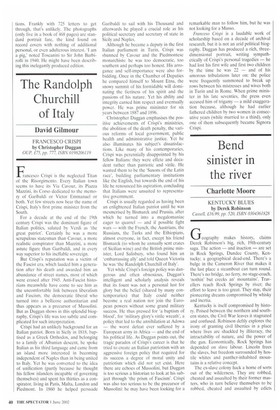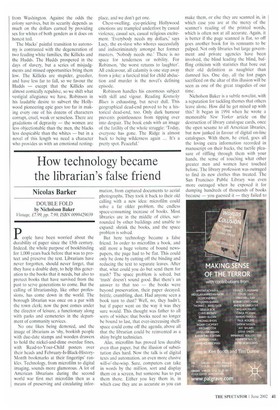Bend sinister in the river
Charlotte Moore
KENTUCKY BLUES by Derek Robinson
Cassell, £16.99, pp. 520, ISBN 0304361828
Geography makes history, claims Derek Robinson's big, rich, 19th-century saga. The action — and inaction — are set in Rock Springs, Dundee County, Kentucky; a geographical dead-end. There's a bulge in the Cameron River that makes it the last place a steamboat can turn round. There's no bridge, no ferry, no stage-coach, `nothin' but creeks an' mountains'. Travellers reach Rock Springs by river; the effort to leave is too great. They stay, their pioneering dreams compromised by whisky and inertia.
Kentucky is itself compromised by history. Poised between the northern and southern states, the Civil War leaves it stagnated and confused. Robinson deftly explores the irony of granting civil liberties in a place where lives are shackled by illiteracy, the intractability of nature, and the power of the gun. Economically, Rock Springs has depended on slave labour. Lincoln frees the slaves, but freedom surrounded by hostile whites and panther-inhabited mountains is a relative concept.
The ex-slave colony hack a home of sorts out of the wilderness. They are robbed, cheated and assaulted by their former masters, who in turn believe themselves to be robbed, cheated and assaulted by edicts from Washington. Against the odds the colony survives, but its security depends as much on the dollars earned by providing sex for whites of both genders as it does on honest toil.
The blacks' painful transition to autonomy is contrasted with the degeneration of two feuding white families, the Killicks and the Hudds. The Hudds prospered in the days of slavery, but a series of misjudgments and missed opportunities bring them low. The Killicks are stupider, greedier, and have less far to fall, so we favour the Hudds — except that the Killicks are almost comically repulsive, so we shift what vestigial allegiance we have. Robinson in his laudable desire to subvert the Hollywood pioneering epic goes too far in making every one of his dozens of characters corrupt, cruel, weak or senseless. There are gradations of depravity — the women are less objectionable than the men, the blacks less despicable than the whites — but in a novel of this length we need a character who provides us with an emotional resting
place, and we don't get one.
Chest-swelling, eye-pricking Hollywood emotions are trampled underfoot by casual violence, casual sex, casual religious excitement. Everybody needs my dollars,' says Lucy, the ex-slave who whores successfully and indiscriminately amongst her former masters. 'Nobody needs me.' There is no space for tenderness or nobility. For Robinson. 'the worst returns to laughter'. All endeavour, all calamity is one step away from a joke; a farcical trial for child abduction and murder is the novel's defining episode.
Robinson handles his enormous subject with skill and vigour. Reading Kentucky Blues is exhausting, but never dull. This geographical dead-end proved to be a historical dead-end, too. Only dark humour prevents pointlessness from tipping over into despair. The book ends with an image of the futility of the whole struggle: Today, everyone has gone. The Ridge is almost back to being wilderness again ... It's a pretty spot. Peaceful.'







































































 Previous page
Previous page